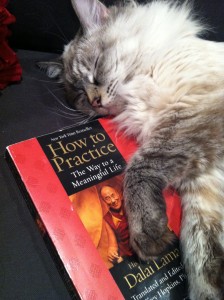Master Dogen speaks,
a bird escapes the cave,
where thought and non-thought are born.
It lands on Bo tree branch,
where it watches the Buddha
and the Devil become one.
Sitting. Thoughts take birth.
Watching. Thoughts become no thoughts.
With a song, suffering ends.
What am I drinking? What am I eating? What am I defending?
Every relationship teaches us about the origin and tenacity of our suffering, for every conflict is the suffering inherent in a self that has some identity to defend.
Am I the ocean or the wave? Does it matter?
Knowing truth is easy and comes quickly. Dissolving the illusion that stands in the way of clear seeing is the hard thing.
When the body and mind drop away, there is no belief that what I am is essentially this or that thing. There is also no belief that I am *not* this or that thing, for this belief is also an expression of the mind seeking to identify with some thing, namely “no one.” “I am no one” becomes another kind of thing in the mind’s story telling. In this way the mind more covertly perpetuates suffering.
One of the things I love about Zen meditation is that it introduces the possibility that I might forget about Zen altogether.
The bird-experience is present, but there is no bird. The sadness-experience is present, but there is no sad person.
The most difficult part of knowing the truth is dissolving the illusion that prevents us from seeing it. Since the illusion is the story the mind lives to tell, knowing the truth requires a dissolving of the mind. Every genuine insight arises because the mind and its story have temporarily dissolved. And the truth is forgotten once the mind rises and the story telling begins again.
He wished to become conscious of what was unconscious so he could know himself, but there comes a time when it is vital to give some of it back to the unconscious. After all, it’s not as if the latter doesn’t know our plans.
A cup of Folgers coffee in the morning. A walk in the woods at sunset. A stranger who smiles at us. The indescribable pain of the absence of someone special. To keep it together, just remember: this is as good as it gets.
From the point of view of dualistic thinking, oneness is a merging of two separate beings that gives birth to a third called “We.” All such merging is inevitably experienced as the sacrifice of “You” and “Me.” To dissolve the dualistic viewpoint introduces the possibility that oneness involves no merging of two into one, but the birth of two from one. To see things as they truly are is to celebrate the diversity that arises from unity, to softly smile with deep gratitude for the We from which You and Me are born, and to which we shall eventually return.
Cashew butter is precious because it tastes damn good, but more importantly because I know that tomorrow it might disappear.
I don’t worry about whether I will survive death, just as I didn’t worry about being born. My worries are rather mundane: Can I pay my rent? Will I be understood by others? Will my lover return? These are my worries. They are rooted in my experience of having something to defend. Now, *there’s* something really to worry about!
If “no self” originates from aversion to self, it’s no different than “self” originating from attachment to being “this” or “that.” In the end, selves and no-selves suffer the same.
Gratitude comes quite naturally once we divest ourselves of expectations.
He fell in love and forgot himself, yet his love failed because he hadn’t forgotten himself. Actually, he insisted on himself quite loudly.
At some level, I feel there’s no difference between God and Bullshit. Each evokes the most powerful forms of worship.
I fell in love the moment I tasted cashew butter. I said I loved it. I actually experienced depression when it disappeared for several months. Eventually it returned, but they had raised the price. It didn’t matter though, and that realization “I don’t care what it costs!” exceeded the pleasure of its taste.
Radha grasped at his smile,
but then the lover disappeared.
There was fire.
Krishna grasped at her fire,
but his mind could not contain it.
Only in the ocean is this revolved,
for from the ocean all things arise
and to the ocean all things return,
especially love.

 Follow
Follow